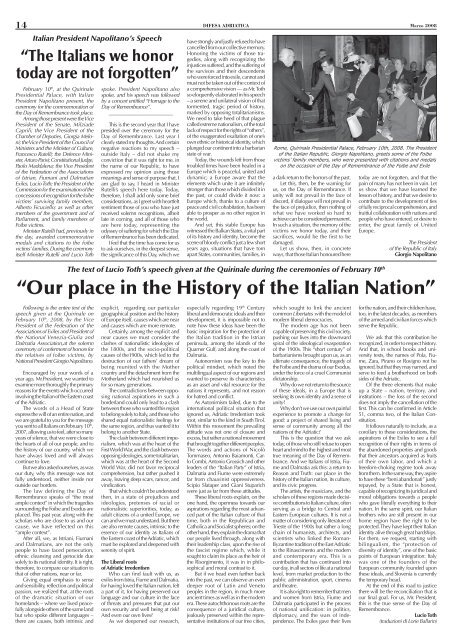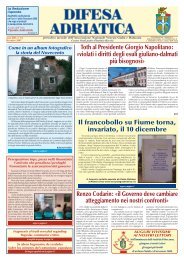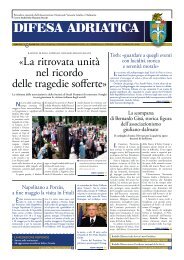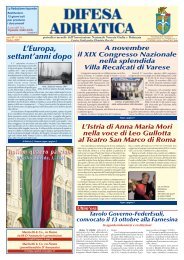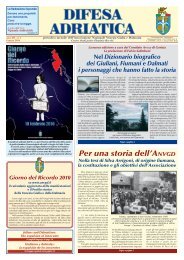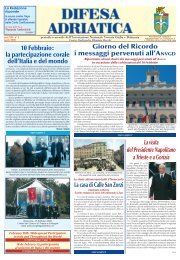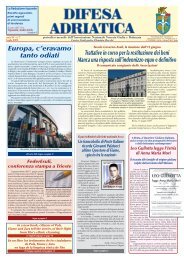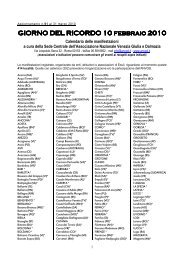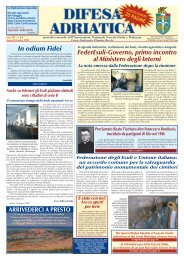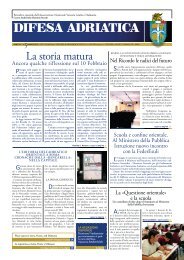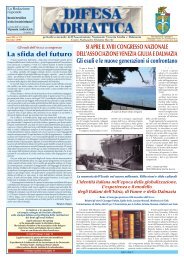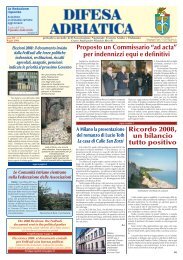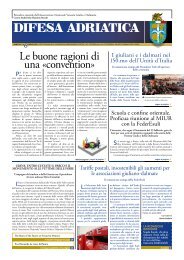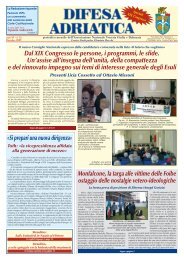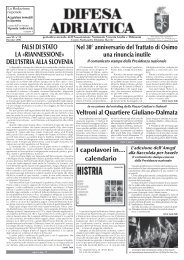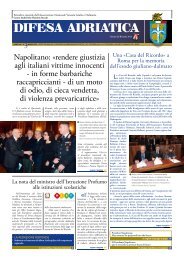«Quegli Italiani che oggi onoriamo non sono dimenticati»
«Quegli Italiani che oggi onoriamo non sono dimenticati»
«Quegli Italiani che oggi onoriamo non sono dimenticati»
You also want an ePaper? Increase the reach of your titles
YUMPU automatically turns print PDFs into web optimized ePapers that Google loves.
14 DIFESA ADRIATICA Marzo 2008<br />
Italian President Napolitano’s Speech<br />
“The Italians we honor<br />
today are not forgotten”<br />
February 10 th , at the Quirinale<br />
Presidential Palace, with Italian<br />
President Napolitano present, the<br />
ceremony for the commemoration of<br />
the Day of Remembrance took place.<br />
Among those present were the Vice<br />
President of the Senate, Milziade<br />
Caprili; the Vice President of the<br />
Chamber of Deputies, Giorgia Meloni;<br />
the Vice President of the Council of<br />
Ministers and the Minister of Culture,<br />
Francesco Rutelli; the Defence Minister,<br />
Arturo Parisi; Constitutional Judge,<br />
Paolo Maddalena; the Vice President<br />
of the Federation of the Associations<br />
of Istrian, Fiumani and Dalmatian<br />
Exiles, Lucio Toth; the President of the<br />
Commi sion for the examination of the<br />
conce sions of recognition for the foibe<br />
victims’ surviving family members,<br />
Alberto Ficuciello; as well as other<br />
members of the government and of<br />
Parliament, and family members of<br />
Foibe victims.<br />
Minister Rutelli had, previously in<br />
the day, awarded commemorative<br />
medals and citations to the foibe<br />
victims’ families. During the ceremony<br />
itself Minister Rutelli and Lucio Toth<br />
Following is the entire text of the<br />
speech given at the Quirinale on<br />
February 10 th , 2008, by the Vice<br />
President of the Federation of the<br />
Associations of Exiles and President of<br />
the National Venezia-Giulia and<br />
Dalmatia Association,at the solemn<br />
ceremony of conferment of honors for<br />
the relatives of foibe victims, by<br />
National President Giorgio Napolitano.<br />
Encouraged by your words of a<br />
year ago, Mr.President, we wanted to<br />
examine more thoroughly the primary<br />
reasons for the events which occurred<br />
involving the Italian of the Eastern coast<br />
of the Adriatic.<br />
The words of a Head of State<br />
express the will of an entire nation, and<br />
we are grateful to you for the message<br />
you sent to all Italians on February 10 th ,<br />
2007, allowing us to feel, after so many<br />
years of silence, that we were close to<br />
the hearts of all of our people, and to<br />
the history of our country, which we<br />
have always loved and will always<br />
continue to love.<br />
But we also asked ourselves, as was<br />
our duty, why this message was not<br />
fully understood, neither inside nor<br />
outside our borders.<br />
The law defining the Day of<br />
Remembrance speaks of “the most<br />
ample context” in which the tragedies<br />
surrounding the Foibe and Exodus are<br />
placed. This past year, along with the<br />
scholars who are close to us and our<br />
cause, we have reflected on this<br />
“ample context”.<br />
After all, we, as Istriani, Fiumani<br />
and Dalmatians, are not the only<br />
people to have faced persecution,<br />
ethnic cleansing and genocide due<br />
solely to its national identity. It is right,<br />
therefore, to compare our situation to<br />
that of other nations, near or far.<br />
Giving equal emphasis to sense<br />
and sensibility, reflection and political<br />
passion, we realized that, at the roots<br />
of the dramatic situation of our<br />
homelands – where we lived peacefully<br />
alongside others of the same land<br />
but who spoke different languages –<br />
there are causes, both intrinsic and<br />
spoke. President Napolitano also<br />
spoke, and his speech was followed<br />
by a concert entitled “Homage to the<br />
Day of Remembrance”.<br />
__________________________<br />
This is the second year that I have<br />
presided over the ceremony for the<br />
Day of Remembrance. Last year I<br />
clearly stated my thoughts. And certain<br />
negative reactions to my speech –<br />
outside Italy – did not shake my<br />
conviction that it was right for me, in<br />
the name of our Republic, to have<br />
expressed my opinion using those<br />
meanings and sense of purpose that, I<br />
am glad to say, I heard in Minister<br />
Rutelli’s speech here today. Today,<br />
therefore, I shall add only some brief<br />
considerations, as I greet with heartfelt<br />
sentiment those of you who have just<br />
received solemn recognitions, albeit<br />
late in coming, and all of those who<br />
are here today, representing the<br />
odyssey of suffering for which the Day<br />
of Remembrance has been dedicated.<br />
I feel that the time has come for us<br />
to ask ourselves, in the deepest sense,<br />
the significance of this Day, which we<br />
explicit, regarding our particular<br />
geographical position and the history<br />
of Europe itself, causes which are near<br />
and causes which are more remote.<br />
Certainly, among the explicit and<br />
near causes we must consider the<br />
clashes of nationalistic ideologies of<br />
the 1800s, and the socio-political<br />
causes of the1900s, which led to the<br />
destruction of our fathers’ dream of<br />
being reunited with the Mother<br />
country and the detachment from the<br />
Motherland which had nourished us<br />
for so many generations.<br />
The contradictions between opposing<br />
national aspirations in such a<br />
borderland could only lead to a clash<br />
between those who wanted this region<br />
to belong solely to Italy, and those who<br />
shared equal nationalistic feelings for<br />
the same region, and thus wanted it to<br />
belong to another State.<br />
The clash between different imperialism,<br />
which was at the heart of the<br />
First World War, and the clash between<br />
opposing ideologies, some totalitarian,<br />
which was at the heart of the Second<br />
World War, did not favor reciprocal<br />
comprehension, but rather pushed it<br />
away, leaving deep scars, rancor, and<br />
vindication.<br />
That which couldn’t be understood<br />
then, in a state of prejudices and<br />
ideologies, pretenses of racial or<br />
nationalistic superiorities, today, as<br />
adult citizens of a united Europe, we<br />
can and we must understand. But there<br />
are also remote causes, intrinsic to the<br />
essence of our identity as Italians of<br />
the Eastern coast of the Adriatic, which<br />
must be explored and deepened with<br />
serenity of spirit.<br />
The Liberal roots<br />
of Adriatic Irredentism<br />
Who can find fault with us, as<br />
exiles from Istria, Fiume and Dalmatia,<br />
for having loved the Italian nation, felt<br />
a part of it, for having preserved our<br />
language and our culture in the face<br />
of threats and pressures that put our<br />
own security and well being at risk?<br />
And even our own lives?<br />
As we deepened our research,<br />
have strongly and justly refused to have<br />
cancelled from our collective memory.<br />
Honoring the victims of those tragedies,<br />
along with recognizing the<br />
injustices suffered, and the suffering of<br />
the survivors and their descendents<br />
who were forced into exile, cannot and<br />
must not be taken out of the context of<br />
a comprehensive vision — as Mr. Toth<br />
so eloquently elaborated in his speech<br />
– a serene and unilateral vision of that<br />
tormented, tragic period of history,<br />
marked by opposing totalitarianisms.<br />
We need to take heed of that plague<br />
called extreme nationalism, of the total<br />
lack of respect for the rights of “others”,<br />
of the exaggerated exaltation of one’s<br />
own ethnic or historical identity, which<br />
plunged our continent into a barbarian<br />
state of war.<br />
Today, the wounds left from those<br />
troubled times have been healed in a<br />
Europe which is peaceful, united and<br />
dynamic; a Europe aware that the<br />
elements which unite it are infinitely<br />
stronger than those which divided it in<br />
the past, or could divide it now: a<br />
Europe which, thanks to a culture of<br />
peace and civil cohabitation, has been<br />
able to prosper as no other region in<br />
the world.<br />
And yet, this stable Europe has<br />
witnessed the Balkan States, a vital part<br />
of its history and identity, become the<br />
scene of bloody conflict just a few short<br />
years ago, situations that have torn<br />
apart States, communities, families, in<br />
especially regarding 19 th Century<br />
liberal and democratic ideals and their<br />
development, it is impossible not to<br />
note how these ideas have been the<br />
basic inspiration for the protection of<br />
the Italian tradition in the Istrian<br />
peninsula, among the islands of the<br />
Quarner Gulf, and along the coast of<br />
Dalmatia.<br />
Autonomism was the key to this<br />
political mindset, which noted the<br />
multilingual aspect of our regions and<br />
wanted to preserve its characteristics<br />
as an asset and vital resource for the<br />
nations it represents, and not reason<br />
for hatred and conflict.<br />
As Autonimism failed, due to the<br />
international political situation that<br />
ignored us, Adriatic Irredentism took<br />
root, similar to the kind in South Tirol.<br />
Within this movement the prevailing<br />
attitude was not one of closure and<br />
excess, but rather a national movement<br />
that brought together different peoples.<br />
The words and actions of Nicolò<br />
Tommaseo, Antonio Baiamonti, Carlo<br />
Combi, Antonio Grossich and other<br />
leaders of the “Italian Party” of Istria,<br />
Dalmatia and Fiume were extremely<br />
far from chauvinist oppressiveness.<br />
Scipio Slataper and Giani Stuparich<br />
were just as far from these attitudes.<br />
These liberal roots explain, on the<br />
one hand, the openness towards our<br />
aspirations regarding the most advanced<br />
part of the Italian culture of that<br />
time, both in the Republican and<br />
Catholica and Socialist spheres; on the<br />
other hand, they explain the drama that<br />
our people lived through, along with<br />
their leadership class, upon the rise of<br />
the fascist regime which, while it<br />
sought to claim its place as the heir of<br />
the Risorgimento, it was in in philosophical<br />
and moral contrast to it.<br />
But if we head even further back<br />
into the past, we can observe an even<br />
deeper root of Latin and Veneto<br />
peoples in the region, in much more<br />
ancient times as well as in the modern<br />
era. These autochthonous roots are the<br />
consequence of a juridical culture,<br />
jealously preserved within the representative<br />
institutions of our free cities,<br />
Rome, Quirinale Presidential Palace, February 10th, 2008. The President<br />
of the Italian Republic, Giorgio Napolitano, greets some of the Foibe<br />
victims’ family members, who were presented with citations and medals<br />
on the occasion of the Day of Remembrance of the Foibe and Exile<br />
a dark return to the horrors of the past.<br />
Let this, then, be the warning for<br />
us, on the Day of Remembrance. If<br />
unity will not prevail in the face of<br />
discord, if dialogue will not prevail in<br />
the face of prejudice, then nothing of<br />
what we have worked so hard to<br />
achieve can be considered permanent.<br />
In such a situation, the memory of the<br />
victims we honor today, and their<br />
sacrifices, would be the first to be<br />
damaged.<br />
Let us show, then, in concrete<br />
ways, that those Italian honoured here<br />
The text of Lucio Toth’s speech given at the Quirinale during the ceremonies of February 10 th<br />
which sought to link the ancient<br />
common Libertates with the model of<br />
modern liberal democracies.<br />
The modern age has not been<br />
capable of preserving this civil society,<br />
pushing our lives into the downward<br />
spiral of the ideological exasperation<br />
of the 1900s. This “short century” of<br />
barbarianisms brought upon us, as an<br />
ultimate consequence, the tragedy of<br />
the Foibe and the drama of our Exodus,<br />
under the force of a cruel Communist<br />
dictatorship.<br />
Why do we not return to the source<br />
of these ideals, in a Europe that is<br />
seeking its own identity and a sense of<br />
unity?<br />
Why don’t we use our own painful<br />
experience to promote a change for<br />
good: a project of shared living and<br />
sense of community among all the<br />
nations of the Adriatic?<br />
This is the question that we ask<br />
today, of those who still refuse to open<br />
heart and mind to the highest and most<br />
true meaning of the Day of Remembrance.<br />
And we Italians of Istria, Fiume<br />
and Dalmatia ask this: a return to<br />
Reason and Truth: our place in the<br />
history of the Italian nation, its culture,<br />
and its civic progress.<br />
The artists, the musicians, and the<br />
scholars of these regions made decisive<br />
contributions to Italian culture, often<br />
serving as a bridge to Central and<br />
Eastern European cultures. It is not a<br />
matter of considering only literature of<br />
Trieste of the 1900s but rather a long<br />
chain of humanists, architects, and<br />
scientists who linked the Roman-<br />
Byzantine tradition of the East Adriatic<br />
to the Rinascimento and the modern<br />
and contemporary era. This is a<br />
contribution that has continued into<br />
our day, in all sectors of life at a national<br />
level, from market production to the<br />
public administration, sport, cinema<br />
and theatre.<br />
It is also right to remember that men<br />
and women from Istria, Fiume and<br />
Dalmatia participated in the process<br />
of national unification: in politics,<br />
diplomacy, and the wars of independence.<br />
The Exiles gave their lives<br />
today are not forgotten, and that the<br />
pain of many has not been in vain. Let<br />
us show that we have learned the<br />
lesson of history, and that we desire to<br />
contribute to the development of ties<br />
of fully reciprocal comprehension, and<br />
fruitful collaboration with nations and<br />
people who have entered, or desire to<br />
enter, the great family of United<br />
Europe.<br />
The President<br />
of the Republic of Italy<br />
Giorgio Napolitano<br />
“Our place in the History of the Italian Nation”<br />
for the nation, and their children have,<br />
too, in the latest decades, as members<br />
of the armed and civilian forces which<br />
serve the Republic.<br />
We ask that this contribution be<br />
recognized, in order to respect history.<br />
And that, in school books and university<br />
texts, the names of Pola, Fiume,<br />
Zara, Pirano or Rovigno not be<br />
ignored, but that they may named, and<br />
serve to feed a brotherhood on both<br />
sides of the Adriatic.<br />
Of the three elements that make<br />
up a State – nation, territory, and<br />
institutions – the loss of the second<br />
does not imply the cancellation of the<br />
first. This can be confirmed in Article<br />
51, comma two, of the Italian Constitution.<br />
It follows naturally to include, as a<br />
corollary to these considerations, the<br />
aspirations of the Exiles to see a full<br />
recognition of their rights in terms of<br />
the abandoned properties and goods<br />
that their ancestors acquired as fruits<br />
of their own labor, and which a<br />
freedom-choking regime took away<br />
from them. In the same way, they aspire<br />
to have these “beni abandonati” justly<br />
repayed, by a State that is honest,<br />
capable of recognizing its juridical and<br />
moral obligations towards a people<br />
who gave literally everything to their<br />
nation. In the same spirit, our Italian<br />
brothers who are still present in our<br />
home region have the right to be<br />
protected. They have kept their Italian<br />
identity alive through great hardships.<br />
For them, we request, starting with<br />
bilingualism, the “protection of<br />
diversity of identity”, one of the basic<br />
points of European integration: Italy<br />
was one of the founders of the<br />
European community founded upon<br />
these ideals, and Slovenia is currently<br />
the temporary head.<br />
At the end of this road to justice<br />
there will be the reconciliation that is<br />
our final goal. For us, Mr. President,<br />
this is the true sense of the Day of<br />
Remembrance.<br />
Lucio Toth<br />
(traduzioni di Lorie Ballarin)


